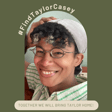Become a Creator today!Start creating today - Share your story with the world!
Start for free
00:00:00
00:00:01

Documenting the Diaspora: Courtney Bowden of Black Expat Stories
Storytelling is how we shift narratives about Black communities throughout the Diaspora. Courtney Bowden of Black Expat Stories shares why storytelling and community building has been instrumental to her journey of living abroad in Mexico. We go in about our shared passion for amplifying marginalized voices, the role of community and mutual aid in the Black expat experience, and the impact of political climate on personal decisions to relocate. Courtney shares her insights on the cultural dynamics in Mexico and her hope for a new era of progress in addressing social issues with nuance and care.
This episode is produced, written and edited by Janna A. Zinzi of WanderWomxn Travels
Transcript
00:00:01
Speaker
Hola, hola, beautiful people.
Introduction to Spirit in the Material World
00:00:03
Speaker
Welcome to the latest episode of Spirit in the Material World. This your Audible Eat, Pray, Love, but remix with Obey, Shea Butter, and Copal.
Meet Courtney Bowden: Amplifying Black Voices
00:00:14
Speaker
I'm so pumped to introduce our guest for this episode today, Courtney Bowden. is a writer, social impact filmmaker who is on a mission to amplify the marginalized voices of Black people in the media through the power of storytelling.
00:00:33
Speaker
And listen, if you don't know what she's doing, we're about to put you on.
Living and Storytelling in Mexico
00:00:37
Speaker
She is a storytelling expat living in Mexico, and she is the founder and chief editor BlackExpatStories.com, so maybe you have seen her, um because it's a beautiful multimedia publication that's dedicated to documenting the journeys of Black diasporic people living all around the world, one unique story at a time.
00:01:01
Speaker
And she's a marketing expert and communications consultant. So you notice his family right here. um And so she spent the last decade developing developing marketing, communication, and branding strategies in partnership with Black-owned businesses, Fortune 500 corporations, and well-respected nonprofit organizations.
00:01:21
Speaker
And right now she is living her best life today. and um in Playa del Carmen, which, you know, if you've ever been, it's a fantastic, just really lovely, lovely, lovely space.
00:01:37
Speaker
And she likes to explore the world with her husband, Larry, the beagle pup Snoopy, kayli though and cooking up culinary um delights, y'all.
00:01:49
Speaker
Venturing out on Anthony Bourdain-like foodie adventures. I've had some really popping tacos, seafood tacos. in Playa del Carmen and my personal favorite learning all the Spanish swear words.
00:02:00
Speaker
So welcome. Hey, Jaz, thanks for having me. I'm so glad you're here. um For the listeners or viewers, we met through the expat summit.
00:02:15
Speaker
And it was, it blew my mind on how good it was. Shout out to Char Winter who organized the Expat Summit back in January. And we had a really beautiful, it was very eye-opening and enlightening conversation for me about, you know, expat versus immigrant and how we use those words.
Expat vs. Immigrant: A Deep Dive
00:02:36
Speaker
um And one of the things that really was exciting to me about the conversation is we got into the idea of narrative and, you know, what it means to use a word like expat when we're talking about black folks, um you know, from the diaspora um versus immigrant, and especially in a time where language is very charged, you know, perceptions of immigrants and what's happening politically and socially to immigrants is, you know,
00:03:08
Speaker
outright cruel. Yes. And, um, you know, also what that choice is about expats. So I really want to, I want to dive into that a little bit, but you know, if you can share just to help people understand how you became a black expat and, um, what that experience has been for you and why that's driven you to want to do this type of
Pandemic and Sociopolitical Influences on Moving
00:03:34
Speaker
storytelling.
00:03:34
Speaker
Yeah, that's a great question. And it has been a journey. So I have been on this journey for about four years now. And it really came about as a result of the pandemic.
00:03:47
Speaker
I've been working remotely since 2015, but my husband at the time was working a hybrid schedule. So a few days in the office and about one or two days at home. And when the pandemic broke out,
00:03:59
Speaker
He went remote and has been remote ever since. And so we identified a window and I was like, look, let's try this out. Let's go. Initially, he wasn't really sold on the idea because he's an Atlanta native, loves Atlanta. And I'm not native to Atlanta. So, you know, it it was a great place for me, but it was not home.
00:04:22
Speaker
and But he was such a great team player and really started to understand some of my grievances with the United States. And I think it was during the Black Lives Matter movement um at the the height of of all of that with George Floyd and Breonna Taylor and others.
00:04:44
Speaker
And he watched that George Floyd video I still haven't seen it because i just can't watch stuff like that. My spirit would be too disturbed, but he watched it. And I do believe that that was a watershed moment for him.
00:04:58
Speaker
It cracked something open in him because he saw someone that looked like him. And he recognized that there were a few differences between he and George Floyd.
00:05:10
Speaker
And he, I think he felt like, man, if that could happen to him, that could probably happen to me too. And so we started seriously discussing this idea of leaving the country.
00:05:24
Speaker
um And initially it was just for a short time. We initially agreed upon six months you know, just trying it out. And, you know, May 2021, we got on that one-way flight.
00:05:38
Speaker
And when I, when we were landing in Cancun and we were all masked up and everything, because this was this was still during the height of the pandemic, yeah I felt tears coming down my cheeks because, and I couldn't even explain why.
00:05:53
Speaker
i couldn't, I didn't even know what was ahead for us. I just knew that it had to be better than where we had come from. And ever since we've touched down, it has been such a blessing.
00:06:06
Speaker
This journey has um shown us things about the world and about people and ourselves that we could not have even imagined had we stayed.
00:06:17
Speaker
And so four years later, fast forward four years later, even on that handshake deal, remember I said it was but it was going to be for six months. And so we checked in with each other at that six month mark.
00:06:28
Speaker
um We just both looked at each other like, we like it here. And so we decided to stay. And then we decided to pursue. um temporary residency through the immigration process. And we have been here ever since.
Documenting Black Migration and Storytelling
00:06:42
Speaker
And one of the major things that really solidified our decision to stay was community. um And then once we got plugged in, because this region is growing, there are so many people coming from all over the world.
00:06:58
Speaker
um And there's a huge and growing black expat community here, very engaged, And once we plugged in and i started having conversations with folks from all over the country, and I started noticing some key themes, you know, about why we left, about why we chose this place um and other places, too, because a lot of people start off here in Playa del Carmen and then they branch out to other places like Colombia, Thailand, Portugal and others.
00:07:27
Speaker
And I started hearing things about, you know, freedom, healing and belonging. And I also started seeing this trend. And it's I don't know if it was because we were now in the midst of, you know, creating this new life abroad.
00:07:44
Speaker
But I started seeing and hearing so much about other people making that move, too. And as a history buff, I love history. I started making some parallels between the great migration that happened in the 1900s, right? Where 50% of black people in the US moved from the South to the North and out West.
00:08:08
Speaker
And so I recognize this as a moment that was important. I thought it was going to be important for us to document. And the parallels were there, but the difference is instead of migrating to other places in the country, we were migrating globally, right?
00:08:27
Speaker
And, you know, on top of all of the um political, economic, and social turmoil that we were enduring in the United States, it just made all the sense in the world to capture these stories, to document them, and to celebrate, you know, those of us who have made this brave decision to leave everything that we know and to venture beyond the borders of our birthplace.
00:08:51
Speaker
And I take a lot of inspiration from, you know, people like Zora Neale Hurston, who, you know, she was doing this a long time ago, a way, way before um it was even trendy.
00:09:04
Speaker
And she recognized the importance of studying our culture because at the time, You know in anthropology and sociology, it was frowned upon to actually immerse yourself with the cultures that you're studying.
00:09:18
Speaker
But she defied convention. And I'm so glad that she did because she is the blueprint for how we approach storytelling um with Black expat stories. And so that's really how the platform was born. i wanted people to see what was happening, right?
00:09:37
Speaker
And I wanted our voices to be at the forefront of that conversation because too often, you know, these narratives get co-opted. they They get whitewashed. And I knew that when the mainstream media got a hold of what was happening, when they finally caught up, that they were not going to tell the full story.
00:09:56
Speaker
And so I wanted the voices of everyday Black people um to be amplified and to be centered because mainstream media ah does a great job of erasing us um and of stereotype stereotyping us right and i just there were just so many people with so many different stories um that deserve to be told and I just feel honored that people have trusted me with their stories to share with the world.
00:10:26
Speaker
I love that. i love that. You do such a great job and that intentionality is so there. And I agree, it's such an important, um like a duty, you know, to be a documentarian and to be someone who's like an archivist.
00:10:42
Speaker
Yes. um And I was having this conversation with someone on on Blue Sky about
00:10:50
Speaker
with everything that's happening, you know, like we're talking about one, things being whitewashed and also like history is being completely eliminated and just like, Well, they're not on the internet anymore. So they that's ah that didn't happen. And like, oh, these museums, burn them down. Well, now you don't know what's going on. Like we have to be the ones that are responsible for telling our stories, for maintaining our stories, for having records.
00:11:15
Speaker
And um I really appreciate how you talk about that moment in time because it was such a turning point for a lot of people. I know a lot of people left the States or got caught out They were out the States when the quarantine happened, you know, I'm just like, well, I stayed, you know, i left, um, and I'm back in new Orleans, but I left in, at the end of 2020.
00:11:39
Speaker
Um, and I probably, sorry to my listeners, if you've heard this story ad nauseum, but you're going it again. But it was, when you mentioned George Floyd, um the protests, for me, I was in Los Angeles at the time.
Protests, State Violence, and Systemic Issues
00:11:56
Speaker
and And I'm from New York originally, so I felt very far from you know my family, my home, like, you know. And I'd been there six years, but it still was like,
00:12:07
Speaker
it felt foreign in a way. um And one of the things that I remember so deeply was the militarization. yes i will never forget this.
00:12:18
Speaker
um And I talked to, her there's a ah friend here who also lived in my neighborhood at the same time. We didn't know each other, but we met here. And we talk about, there was a tank, like an actual military tank on the corner street.
00:12:34
Speaker
like And it's a busy corner where literally I would go to Trader Joe's, the movie theater was there. There was like a Starbucks, there was a McDonald's. Like this is a corner, a gas station where just this big old tank is sitting there. And I was like,
00:12:48
Speaker
ah what? On top of the fact that everything, a lot of stuff was boarded up because of, you know, um really because of fear.
00:13:00
Speaker
Now, were people acting a fool and looting and taking advantage of a time to to act stupid? Yes. But it wasn't no protesters doing that. there was this like,
00:13:12
Speaker
overreaction to people rising up. yeah you know And then again, that that can be a whole conversation about narrative, right? and like creating a fear-based narrative and also like, oh, these protesters are dangerous. So then it's okay to like use excessive force, you know? But anyway, I use that example because that was on top of this pandemic. It's like that it that George Floyd time had so many, there were so many different layers and levels to what that showed about the country.
00:13:48
Speaker
Yeah. you And, you know, I i had known, For sure. The underbelly of the United States. But it took my husband a little while to um catch up to that reality because he was very optimistic about the the state of the country. you know Even when I would try to broach the the conversation in times past, he would he couldn't understand the urgency in my spirit.
00:14:20
Speaker
um And he was like, you know things are changing. And I said... Not really. you know, as someone who grew up in a sundown town, as someone who integrated, whose family integrated two neighborhoods in the 80s and in the early 2000s, I saw the ugly underbelly of the United States from every single angle possible.
00:14:44
Speaker
And I just didn't have any more hope left that my presence here or there was going to make it any better. and that if we stayed, what was going to happen? i If we stayed, right, what was going to be the quality of our life?
00:15:03
Speaker
And now, and I'm so happy that you mentioned the militarization of the police, because that had been going on for decades. Right. um And now we're starting to see another layer come to the fore because now the, the, the protests on college campuses are being squelched out. And we know that it was college students in, you know, during the Vietnam war and, you know, all these other, you know,
00:15:33
Speaker
points and time these inflection points in American history that truly made the difference. And so when we start seeing the the squelching of dissenting voices, I mean, that was that was a huge red flag for me, you know among other things. And so, yeah, it was it was um jarring to see.
00:15:53
Speaker
And I think that's part of the reason why um so many Americans are hesitant to hit the streets in a meaningful way, because i believe that there's this latent fear that the government would actually turn on its own citizens and exact force.
00:16:13
Speaker
even though it's not being said very often, i believe that is a sentiment. Definitely, definitely. um And to me, it's like, I was having a great conversation earlier today about like cognitive dissonance and like, and the the kind of really,
00:16:33
Speaker
the the wild things that our brains will do for survival. Yeah. You know, and I think it's hard to, ah for a lot of folks to wrap their heads around about like that, that level of violence could happen to them. Particularly if you see like, you know, a lot of like white protesters who are in the streets maybe for the first time, or like they're getting activated, you know, like, um,
00:17:00
Speaker
Because like we've always known like our bodies were targets for violence, you know and have been targets for violence. and so you know But it's also too this like survival thing of like in a disconnect, I think in certain ways. And I say this not from a judgmental way because we, we all do it in different ways of like the reality of what we're seeing and what we're experiencing.
00:17:29
Speaker
um and like not necessarily believing things can happen here. Yes. Yeah.
The Media's Role and Expatriation Interest
00:17:37
Speaker
It is a survival mechanism. You know, it's, it's almost like the, the frog in the boiling water, right? Yeah, exactly. where You, it just, it,
00:17:47
Speaker
it builds and builds and builds. And by the time a lot of people recognize what's happening, it's too hot, you know, and it's time to jump out if you can.
00:17:58
Speaker
Right. um right So, so yeah, it is, it is about survival and there's so many ways that we get gas lit in the media, you know, and that's why it was important for me to create black expat stories too, because media is one of the most powerful ways to tell a story.
00:18:16
Speaker
And um now with history being actively erased, like you mentioned before, we need platforms, we need people, ah we need documentation that says we were here and this is what happened.
00:18:31
Speaker
And so I believe that you know Black Expat Stories isn't just a cute thing to do on social media. it's not It's not a platform that follows social media trends. It really is about creating a cultural archive for generations to come.
00:18:46
Speaker
ah We need that. We need that. And you know I think it's also you know a source of inspiration for for folks too. And I have a lot of questions around that. um what are I guess what I'm trying to think about is, you know what are you experiencing in terms of people's responses right now in the moment? um you know i think one of the things that was like kind of getting my goat, as they say,
00:19:15
Speaker
ah when right after the election, like there were all these folks online like, hey, now you're really thinking about leaving the U.S. Call me, you know, or like, let me give you this, you know, consultation for whatever. Like, it was just like, so it was so like,
00:19:32
Speaker
on brand capitalism. Let me capitalize on your pain and sell you something and your fear. And it was all sorts of people. It was all sorts of folks from all sorts of races, genders, persuasions. And I was like, dang y'all, this is,
00:19:49
Speaker
gross, you know what i mean? But, you know, the dust has settled and it's also everything's getting kicked up, and you know, in terms of understanding this reality, like a a new, very blatant reality that we're experiencing. So I'm curious,
00:20:08
Speaker
you know, what has been the response? Are people in your family like, yo girl, so how do I come on out there? Or what, you know, are, our um you know, are you getting more response to the work that you're creating more questions?
00:20:24
Speaker
Yeah. Yeah. um Well, it's interesting because after the election, um we saw that, Google searches, internet searches for moving abroad increased like a thousand percent. right And so that spilled over into getting all these DMs and messages and ah from people who were looking for ways to get out, you know, where to begin.
00:20:54
Speaker
and um and even now where I'm still fielding a lot of questions and and it It seems like with everything that Even, you know, it hasn't even been 90 days of this new administration. Which is nuts.
00:21:12
Speaker
It is crazy. So when when you were talking about like how we met in January, it felt like a lifetime ago. It really does. It was really just a few months ago. um But initially, and so want to talk about a little bit how the response now to living abroad um is juxtaposed against what I experienced when I initially moved because people really thought we were crazy, especially when we said we were coming to Mexico.
00:21:42
Speaker
And i often tell people, you know, the difference between sometimes the difference between um being recognized as brilliant or crazy is just time.
00:21:55
Speaker
You know, relate to that so much. Yeah. Sometimes you're just a little ahead of the curve and that's why it's important to truly, um, follow your inner knowing.
00:22:06
Speaker
yeah And so, you know, I'm so happy we left when we did because now all of this urgency and, you know, this panic has really created another market for people to get, um taken advantage of. Right.
00:22:24
Speaker
And so, You know, you have folks who are touting themselves as relocation specialists, as immigration experts, and all of that. And so now is now more than ever, it's important to be discerning about where you get your information from. But, you know, initially we got those weird looks, those questions about why, and like, okay, girl, I guess.
00:22:47
Speaker
And fast forward to now.
Expatriate Impact on Mexican Communities
00:22:52
Speaker
um It's, man, hu I wish I could do it or how do you do it? um And so that is, i'm not gonna lie, it's a little bit gratifying because it it's like, you know,
00:23:06
Speaker
When you're a visionary, it can be difficult to live it out on a day to day. You know, again, difference between being called loop being labeled crazy or brilliant is time and time has, has really been on our side in that way. So a lot of questions are coming through, um a lot more interest I'm seeing even here, which, you know, this region of Mexico is one of the fastest growing cities in the country.
00:23:35
Speaker
the development, you know, the rapid development. there It seems like I'm meeting new people every single day or every single time i really go out into the city center.
00:23:46
Speaker
um And so folks are leaving with their families. they're They're leaving without their families, right? um And my family isn't really um inquiring a lot about how they can do it.
00:24:01
Speaker
Many of them have decided to stay put and it's not moving is not really on their mind. But a lot of my friends have come back and asked, you know, how it can be done and what they can do to really prepare themselves for a move like this, because don't get it twisted.
00:24:18
Speaker
It may seem like a rash decision, but it does require much preparation. Yes, absolutely. Absolutely. Thank you for naming that too. I think um ah think there's like a romanticization of it, of just like, I'm picking up and going, you know? um But like to really, just like moving anywhere to uproot your life, you have to have some, you know, level of planning and preparation, um you know, especially something like a move to another country.
00:24:52
Speaker
Absolutely. Yeah, absolutely. Definitely. What's the vibes then, um you know, being in Mexico and y'all's president is a G. Let me tell you, Presidenta is not playing. Yo, she's the truth.
00:25:11
Speaker
Yeah. um I'm living for her. But I'm curious, like, what's the vibes on the ground twofold, right? Like, yeah you know, local folks, meaning like Mexican folks, are they looking at us like, you know, and they should, but also, you know, how is the rapid, you know, development impacting the community?
00:25:36
Speaker
And then also too, what are you experiencing from, you know, folks who are on the ground, who are black expats living there, like, you know because there's ripple effects for what's happening here. Like if you're ah from the states of the states making US money, you know have family and friends here, it's like there's you're still gonna feel that. So I'm just curious, you know like a vibe check, how are people navigating and in feeling with all of this political,
00:26:09
Speaker
Uncertainty tariffs. I mean, so many, so many things. Yeah. Well, that, this is a really good question. I'm glad that you, you asked cause it's, it's really layered. Right. So locally, and I'll also want to just.
00:26:23
Speaker
Cheer for context that Mexico is a huge country. I didn't recognize or realize how large this place was until I got here. It has 32 States. you know?
00:26:34
Speaker
And so we talk about the vibes in Mexico. I don't, I want to be careful about not, you know, painting my experience as the experience because, um the Riviera Maya region, the Caribbean region is radically different from places like Mexico city or even the West coast or even the North. Right.
00:26:56
Speaker
But what's happening here is, as I mentioned, a lot of development. um Again, it's one of the fastest growing places in Mexico. There's new construction everywhere. Of course, there's an influx of global residents that are coming.
00:27:11
Speaker
And I'm writing a book about this right now. It's called The Exodus Book. And it's about highlighting Playa del Carmen's newest residents since 2020 and our impact on the land, on the local people, right, and the culture.
00:27:29
Speaker
And so I've been having quite a few conversations with locals, just trying to get a vibe check. Right. Because, um, one of the things that I need to mention too, about the state that I'm in, Quintana Roo, which encompasses Cancun, Playa del Carmen and Tulum is that it is a very young state. It's one of Mexico's youngest states, right?
00:27:52
Speaker
um And it was a state that was built off of tourism. So a lot of things are um are built for Americans, are built for Canadians and folks from the UK. And so it's kind of hard to gauge what ah many Mexicans feel about our presence here.
00:28:14
Speaker
But I have been able to have some of those conversations. And interestingly enough, every single one of the conversations that I've had um with locals has been eye opening.
00:28:27
Speaker
They're so welcoming. They're so welcoming. I spoke with this this local guy. And I was just expressing like, oh my gosh, you know, i feel so ashamed at times of being from the United States and how often, you know, folks come here to Mexico to treat it like their background or I'm sorry, their, their backyard, their playground, you know, that often happens in, in places like Playa del Carmen and Tulum and Cancun and Cabo
00:29:00
Speaker
saw And so I asked him, I said, you know, how are you feeling about so many people moving here? Because he's Mayan, right? This is his land.
00:29:11
Speaker
Okay. And he, it made me cry afterward. I had to come home and have a good cry. He said, you know, we love the fact that that you guys are coming.
00:29:23
Speaker
um And I'm so proud of myself, because I had this i had this conversation entirely in Spanish, too. um he he He mentioned how we're welcomed here, so long as we're respectful. That was the only thing.
00:29:37
Speaker
that he asked the only caveat. Right. And again, i don't want to make the mistake of saying that every single Mexican feels this way, because that is not the case. I have heard some things from my other expat friends who have come against some resistance, right?
00:29:55
Speaker
Um, there's this whole gringo go home movement right that, is really big in places like Mexico City. Because the reality is when we come here with our American dollars or Canadian dollars or British pounds or euros, um inevitably it shifts the economic ah system, right? And there are there are things like gentrification and rising costs.
00:30:23
Speaker
And unfortunately in places like Tulum, the locals are getting pushed out at a rate that is disgusting. Tulum was once a once a sleepy beach town and now it is unrecognizable.
00:30:38
Speaker
And what does it mean for those of us who are coming as a result of what's happening in the United States or just wanting to live in another place um What is happening to the people who were already there?
00:30:53
Speaker
And so that is one of the reasons why we are writing this book. My co-author and I, I was able to collaborate with a fantastic, um super talented global photojournalist.
00:31:05
Speaker
So it's going to be a coffee table project. coffee Yeah, so we're goingnna you're going to be able to see the faces of the people who are here. oh and And so, yeah, the pace of change is rapid.
00:31:18
Speaker
And that brings about a lot of opportunities. So what I've been seeing is many Mexicans have been migrating. to this area for jobs.
00:31:29
Speaker
um A lot of them come here to make money. And um there are some tensions, right? Because the very thing that brings people to this region, the beauty, the ecology, the coral reefs are the very things that are in danger because of the rapid development. Right. The train that was an issue. a Mayan train. Yeah.
00:31:53
Speaker
Yeah.
Political Progress and Social Recognition in Mexico
00:31:54
Speaker
And so Also to the affordability piece, right? So we came here in 2021, were immediately able to reduce our living expenses by 50%.
00:32:06
Speaker
here Now, that ain't the case anymore. um Prices have gone up, but the prices have gone up everywhere. Absolutely. However, again, um that also means that it is much more difficult for locals who are making Mexican pesos to continue living here in Playa, living in Tulum and Cancun and other places.
00:32:30
Speaker
um As far as generally, from what I can ascertain, though You mentioned the new president who took office back in October, october Claudia Scheinbaum-Pardo.
00:32:43
Speaker
um She's the first woman president. And it is so wild to watch the juxtaposition between what's happening here and the leadership here in Mexico versus the leadership in the United States.
00:32:57
Speaker
And... What's interesting is during this last election, there would have been a woman president regardless here. I noticed that. Right, right.
00:33:09
Speaker
And that signals to me that despite the machismo culture that pervades Mexico, because it's very machismo, don't get it twisted, femicide and women's rights are still huge issues that need to be addressed.
00:33:25
Speaker
But the fact that the people... Elected a woman to lead them means something. It means that there are shifts in this culture ah it means that progress is on the mind of many Mexican people.
00:33:40
Speaker
And, you know, I was just kind of doing a little digging to understand the sentiment. Now it's been about six months since she took office and her approval ratings are through the roof.
00:33:51
Speaker
Good. You know, um, she is not a career politician. She's a climate scientist and academic. Right. So she has spent her career studying the impacts of climate.
00:34:03
Speaker
And that is, you know, one of the major things on her presidential agenda is addressing climate because we have places like Mexico City that you know have been teetering on water crises for a while, you know, um and her leadership style seems to be very calm and strategic. Like, you know, she wrote an open letter to President Trump.
00:34:26
Speaker
she sure She's not taking it laying down at all. When we talk about the tariffs, when we talk about all of these things, the the borders, um she is not kowtowing to to the American imperialism. And that is refreshing to see.
00:34:43
Speaker
Another thing that's really refreshing to see in here is the ah doubling down women's rights and equity. So she's introduced new bold constitutional reforms and expanded women's rights. yes um And even announced a new program, a pension program for women between the ages of 60 and 64 with special priority given to indigenous and Afro-Mexican women who have been matriarchs in their families, right? Who have taken care of other people
00:35:16
Speaker
and have found themselves economically vulnerable. right And so now there are measures in place to take care of those women who have been taking care of their families for so long. And I love to see that. So we have we have this visionary leadership here, right?
00:35:34
Speaker
um Putting indigenous people's rights at the forefront, women's rights at the forefront, compared to what's happening in the United States where women are losing their bodily autonomy rights, Roe versus Wade fail, so many other things that are happening.
00:35:53
Speaker
um You know, even talking about the environment, reinvesting in renewable energy and infrastructure and public transit to reduce emissions and all of those things.
00:36:05
Speaker
And one of the other things that strikes me is I just wanna keep coming back to this because it's so important. theization the The recognition of indigenous peoples and Afro-Mexicans. So just to give a little context, Afro-Mexicans were not recognized on the Mexican census until 2020. It's only been five years that they've been recognized as a people.
00:36:32
Speaker
Yeah. Wow. um And so that shows me that progress does not have to be slow and it does not have to be at a snail's pace, you know, um because like we talk about change and we talk about reforms. A lot of times people want to make us believe that it has to be.
00:36:53
Speaker
It has to take generations. Right. And some of these ideologies do have to die out. And that will come with the the shift in demographics. But when change is truly on the agenda and when it's truly a priority, it doesn't have to take a lifetime. And that's one of the things that I can appreciate. And so.
00:37:13
Speaker
You know, President the Scheinbaum even declared 2025 the year of the indigenous woman, spotlighting the cultural and societal contribut the contributions of these women, right?
00:37:25
Speaker
yeah um And just being centered in these conversations. So being a black woman here in Mexico at this time, it makes me feel hopeful. oh Hmm. And that's a huge juxtaposition of like being in the United States. Yes. Being a black woman, there's like not a lot to be hopeful about.
00:37:45
Speaker
Yes. no so No, Really, frankly, um in terms of where there's there's always things to be hopeful about, but in terms of the direction of the country, there's not a lot of hope um in there. And I remember a few years ago,
00:38:03
Speaker
being at a conversation, um it was a talk about reproductive justice and rights in in Brooklyn. And I have some really incredible colleagues who were on the stage and were in the audience um with me.
00:38:16
Speaker
And, you know, talking about the badass Mexicans, you know, women in the in Mexico City, who fought super hard and really I think there's so much to be learned from a lot of like Latin American yes activists, um particularly like feminist activists, um but how they were able to make abortion legal in Mexico City, like starting in Mexico City and now, you know to your point is like seeing how,
00:38:49
Speaker
you have the right people in office and how that spreads, right?
Learning from Latin American Movements
00:38:53
Speaker
And just like that that constant work of those activists for years to make that happen, that kind of was like starting this domino effect of what we're seeing now. And so I think, and i one of the things that's so interesting, and I hope that, I mean, I know my listeners will, but just that I hope in general is that looking to the resistance movements from Latin America, from other countries for lessons, you know, and for inspiration, because, you know, I think what's hard for folks to understand how we were talking about this cognitive dissonance is,
00:39:37
Speaker
the idea and being raised and this idea of the American dream and Americans on top. And like you know we've always had America first kind of as a as a mentality that's been drilled into us, even if it wasn't said that said that way. right like right Maybe that wasn't the language that was used, but that was implicitly what was you know being being affirmed.
00:40:01
Speaker
And you know the idea of seeing like these other countries as like third world or like behind, or even this idea of like developing countries, now having to take a real serious look in the mirror, and I think particularly for folks who are looking at moving elsewhere or living elsewhere, is like you have to completely reframe that and challenge yourself as you're looking at things of like,
00:40:31
Speaker
What's really, what's, what's forward, what's backward, what's progressive, what's not, you know, what have we been sold a lie around, you know, and how are people doing things in ways, whether it's community building or if it's just, you know, politically, how are people doing things in ways that are progressive,
00:40:54
Speaker
efficient and like motivated for change yeah as opposed to, you know, the ways that we've been told are the right ways to be, the right ways to govern, the right ways things should look.
00:41:04
Speaker
um Even though we know that they've produced deep inequities and produced the sentiments that we have here now, like manosphere and all of this. So it's like, it was just so interesting you talking about, you know, this like year of the indigenous woman and having this woman president and in and recognizing Afro-Mexicans and we're like on the opposite where it's like manosphere and that's a global thing, but like it's centered in like, you know, United States. Yes.
00:41:33
Speaker
Internet culture. Yes. um You know, and like the, erasure of black history of prominent African-Americans. Like I think about the African-American museum, like the black Smithsonian, as we call it, right? Like thinking about that. So it's just such an interesting time. And I'm so excited that you're writing this book to be able to mark this period of time, because it really has again, been ah very recent,
00:42:08
Speaker
Um, it's become more of a recent phenomenon or like there's been an increase of folks really, really considering what their life is. Um, what's possible for their life outside of the United States.
00:42:23
Speaker
Absolutely. Absolutely. And I, and I have to, um, for it's many flaws and drawbacks. I do have to credit social media for part of that because it has really helped to eliminate many of the gatekeepers of information. you know i think that's part of the reason why there's there's this campaign to ban TikTok because people are sharing their lived experiences, they're sharing their expertise and information is being democratized.
00:42:55
Speaker
yes And so when people you know you see people especially black people on these platforms talking about how they're living their best lives outside of the United States. That is powerful. That is that is transformative. And I believe it is one of the driving vehicles of what I believe to be America's next great migration.
00:43:19
Speaker
I love that. That, uh, comparison and and how you open talking about the next Black migration and um ah thinking about the book Beyond the Shores.
00:43:32
Speaker
hu Oh, that folks should really read that and forgive me, I'm going not remember the the beautiful author's name, um but I've like posted about it, I've talked about it, and it really chronicles that history of how we have you know, always been moving out of the U.S. Not, you know, maybe there were times where there was more, you know, larger numbers, but um and the like the gifts, the joys, the challenges, you know, what it felt like to have political persecution, um what it felt like to be an artist living, you know, outside and and being received.
00:44:13
Speaker
um with love. And there's so many different experiences of that. And I, I've been thinking a lot about people like James Baldwin and Eartha Kitt and also to like what it feels like to, there's a difference. I say this all the time. There's a difference between like making a choice to leave somewhere and feeling like you have to flee.
00:44:40
Speaker
And there's a fine line, I think, to that. And i always talk about my love of New Orleans and how I love moving here. And what I wanted to share with you earlier, and I say this is what I say a lot, is that when I left LA, said, New Orleans is my last stop in the United States.
Community and Cultural Preservation
00:44:57
Speaker
I was like, that's it. If I can't, this is the only place in you the U S I want to be. yeah It's the least like the United States. You're so right about it. I got married in New Orleans, you know, New Orleans is one of my favorite cities in the world.
00:45:12
Speaker
And I agree with you. It does not even feel like you're in the United States because the, the preservation of culture there has been so strong.
00:45:24
Speaker
And I credit that to blackness, yes to black people. Right. And even though the city has changed significantly since the 20 years of her of following hurricane Katrina, um and it is not the same, it is not the same, but it is, it is a cultural powerhouse.
00:45:44
Speaker
um And it's, it is a model. I believe for other cities in the U.S. Yes. I mean, there's the saying, um everything you love about New Orleans is because of black people. That's true. The food, the music, everything. cannot deny this. You cannot deny this.
00:46:02
Speaker
um you know And um it is it's it's it's an interesting you know reprieve and also there's, it's so interesting because it's this like dot and then you have this big state and like big country around it that is very, very on brand, let's say for typical, you know, US s and and New Orleans is ah is a complicated and challenging place at times.
00:46:32
Speaker
um You know, it is, but it really is the culture. It is the the Africanness, the indigenous energy, the, you know, i think a lot about the Haitian connection, um that revolutionary spirit, the immigrants from all over that came here, you know, like just um that really, really provides so much power and beauty, you know, and also, know,
00:47:07
Speaker
That's what i think what makes these you know the this time challenging is like navigating being in a place that you love. And I know a lot of like listeners who are or or the audience is like, you know it it's a hard feeling of like you may love your community or like love your city, but not love what's happening around you. And how do you continue to navigate that?
00:47:30
Speaker
um knowing also like safety and quality of life are very, very real things. And I think it's important what you're doing to be able to show the various ways that people are living and people are, you know, experimenting. And like, you were like, we tried it for six months and we loved it. You know what I mean? And so like.
00:47:50
Speaker
You know, how can people just planting those seeds, I think are really, really important in this time, because like you mentioned, we have four fathers, four mothers who have done this, yeah you know, and and made ways and made homes and created art and built families and built businesses.
00:48:12
Speaker
um and And we're in a time where we actually have the ability to do that if we want. If we want. I agree. i
A New Renaissance and Sustainable Freedom
00:48:20
Speaker
agree. i think that we are in um a renaissance period, you know, because it's that the opportunities are there.
00:48:30
Speaker
Yes. The... um so many people being untethered from a physical, having to work at a physical location is game changing. Yes. You know? Yes. Um, whereas before making this move might have seemed out of reach until after retirement or maybe until after you get a windfall, but that's no longer the case, you know?
00:48:54
Speaker
And you asked a little bit earlier about how, you know, it feels being here um amongst the shift, right? and And because we, you know, Mexico borders the United States. So what happens there certainly impacts what happens here.
00:49:14
Speaker
And i have been, I believe that, and i'm I've been telling people that what is happening now is, in my opinion, white supremacy's last stand.
00:49:28
Speaker
It is the attempt to take its last hairy breath yep to grasp at power. And one of the ways I'm seeing that at work is this back to office mandate.
00:49:41
Speaker
I was going to say this to you, just as you were just talking about the, um, you know, like working remotely is like, I'm like, that's why they're shutting that down. Yeah.
00:49:52
Speaker
it's it's it's um It's an attempt to control, right? um Nothing else because it doesn't even make sense at this point for many folks to go back to the office. They don't even have space for people. at Right. think what are you Exactly.
00:50:09
Speaker
Exactly. But i I suspect it's the powers that be who see that so many people have bettered their quality of life just by cutting out a commute, by not having to be, especially for black people and other marginalized folks, right not having to be at the site, at the physical site oh microaggressions and you know office politics.
00:50:37
Speaker
And so the way that I'm seeing that play out here is that many people who have had remote jobs, have called them back to the office. And so many folks who have been here, um some of them have gone back as a result of that.
00:50:52
Speaker
um And then, of course, the the economy yeah is making it such that folks are, you know, trying to find ways to sustain their lives outside the United States. And so I think that, you know, while it is great to leave and to be to extract yourself physically out of that environment, what I would love to see the conversations shift more toward is sustainability, right?
00:51:19
Speaker
How do we live and maintain ourselves in community outside of the capitalistic, patriarchal, imperialistic, white supremacist society that we came from?
00:51:35
Speaker
So to me, that's the next step because I believe that freedom happens and and in process, right? And it happens in ways. And so I do feel a sense of freedom, but I don't feel all the way free because a lot of my money comes from the u s yeah the US, s right? We're on the USD.
00:51:50
Speaker
And so what is on my mind right now is how do we begin to subvert some of these economic structures to create communities that can sustain themselves outside the United States?
00:52:02
Speaker
Right. You are a woman after my own heart because yes. Like those are definitely the the ongoing
Community Building and Collective Responsibility
00:52:11
Speaker
questions. And i I think, you know, it's it's pointing to, and it this the conversations of mutual aid that are coming up. yes you know Particularly in the United States, how black communities, black folks have always had mutual aid, ah you know immigrant communities as well. like that It's just a thing. Indigenous folks like understand mutual mutual aid and community care.
00:52:33
Speaker
And like what you said is like the 201, 301, 401 level of that like not just okay like making sure like folks have their rent or have you know extra vegetables or whatever it is, but like like a divestment conversation and like what, you know, how do we navigate that? And that, and it's so interesting that you say that because there is that community building where you are.
00:52:59
Speaker
And then, you know, also here, you know, folks are engaging in conversations around mutual aid in ways that haven't been um, um you know, as present until now. And that part of, you know, looking back to our elders, like, again, that they have so many lessons from us, not just our ancestors, like we were mentioning, you know, like Zora Neale Hurston, who just is an incredible person to to look at. And like, I think about like Catherine du Dunham, when you were talking about like the anthropology piece, you know, I think about Eartha Kidd a lot because she was like,
00:53:37
Speaker
Um, the FBI was coming after her and all sorts of stuff and, you know, as a, as a performer, but you know, what are, what are these networks look like?
00:53:48
Speaker
Um, and I think having these conversations and what you're doing with the the archiving and just my gratitude for you, this to me is part of that mutual aid is how we're able to share information, share stories.
00:54:06
Speaker
um document those stories, have tangible evidence um you know and tangible inspiration for how we care for each other, how we care for ourselves, and how we participate in a global community knowing how our you know how the united States has um impacted our ability to do that, like the ability to build global communities, especially across the diaspora and with our like, you know, indigenous um friends, our immigrant friends, all of all of the the folks who are kind of under the the microscope right now.
00:54:49
Speaker
Yeah. And one of the things, one of the gifts that this journey has given me is um the ability to center community.
00:55:04
Speaker
I think in the United States, um one of the the ways that capitalism robs us is that it takes what we need to live and survive inherently as humans away from us.
00:55:22
Speaker
yeah And it sell it it sells it back to us. Exactly. Right? at ah At a massive upcharge. And so here though,
00:55:33
Speaker
And because of just how important community is to the Mexican culture, I have been able to engage in community and mutual care efforts and all of these things more freely, um along with people who are like-minded more than ever in my entire life.
00:55:54
Speaker
um Last year in October, we because I also do on-location episodes for Black Expat Stories highlighting different spaces that folks have created. And we highlighted a food truck here that was owned by a black woman.
00:56:10
Speaker
And we did a watch party fundraiser. And so we gathered the the community, you know, not just the expat community, but the local community, local businesses flooded us with donations for the raffle that we did. And we started off with just a handful of prizes. And by the end, like literally up until the day of the event, I had to like, unfortunately turn people away from giving us things.
00:56:39
Speaker
incredible um And we were able to raise nearly a thousand dollars to support this black woman owned business. And so i feel like it's things like that, um, that make me say, wow, this is, this is possible.
00:56:56
Speaker
And it's possible outside the United States is possible within the United States, but the the States makes it so difficult because we also have a very individualistic society.
00:57:07
Speaker
We have been conditioned to believe that our survival is an individual burden as opposed to a collective responsibility. And here, it feels like the opposite. It it feels like, i even though I'm not related to these folks here, it feels like I can call up my people and be like, if Ish hit the fan and I couldn't pay my rent, I feel like there is a community of people who have my back.
00:57:38
Speaker
And even for folks who, you know, if you're if even if you might not be thinking of leaving the United States anytime soon, Creating and cultivating community at this point in time is crucial. It always has been. We have always needed community.
00:57:56
Speaker
And I argue that black people in particular have always been communal. We've just been conditioned to be individualistic. But now, oh, it's it's time to get to know your neighbors. It's time to start cooking family-style meals and inviting people over.
00:58:10
Speaker
It's time to mutually care for one another because we as it has been demonstrated, Again and again, we cannot rely on the government or any other external entity to take care of us. We truly are all we got.
00:58:27
Speaker
I'm going to leave it on that because you just... perfectly laid it out. It is 100% the truth. um And when we come together, we win. you know We really do. And I can't affirm that and assert that ah enough.
00:58:43
Speaker
So I hope folks will really sit with with you, Sherrod. And that's actually actually one of the reasons why i What I appreciate that appreciate about New Orleans is that it's communal in that way where you know it it's just people, even the basic act of like people saying hello to each other in the street or you pass by, you know your name, like I know my neighbors name, which is like, you know, a thing like what?
00:59:07
Speaker
um just basic recognizing each other's humanity and knowing we're in shared space together and, and that commute, like having some sort of care or just like understanding of that is, um,
00:59:24
Speaker
is the baseline the baseline. And, um, I agree with you about this. We are communal by nature and, you know, it's again, one of those tactics, a survival tactic that has been impressed upon us to be individualistic and to, and that's what also I think uplifts and maintains the hierarchy that allows, um,
00:59:52
Speaker
this, you know, okay, it's them, not me kind of kind of thinking. So... Listen, we could go on and on and on. This was such a, just a blessing and we're overdue for conversation on ah narrative.
01:00:08
Speaker
ask them Offline nerdy narrative combos. Cause I love this.
Conclusion and Call to Action
01:00:14
Speaker
So can you tell folks, how can people, you know, stay in touch with you and, and check out expat um black expat stories?
01:00:23
Speaker
Yeah. Well, you can find us on YouTube. ah you know I encourage you to subscribe to our channel so that you don't miss another episode when it drops. We have some incredible conversations that are coming up You know, we're developing season two and we're going to be sharing those conversations, those new conversations very, very soon. But until then, you can binge watch season one.
01:00:45
Speaker
We also have another incredible series of shorts called Ask an Expat, where you can tune in to everyday folks who are asking or who are answering questions.
01:00:56
Speaker
you know, the burning questions that I get so often about this life. You can also follow us on Instagram and TikTok at Black Expat Stories. We're Black Expat Stories everywhere.
01:01:09
Speaker
And because these algorithms are so tricky, I really encourage people to join our global community, which is our email list, um by going to black expat stories dot com slash newsletter so that you can get updates and expat related resources right in your inbox.
01:01:30
Speaker
I love it. I'm put it in the show notes and I love your newsletter, by the way, it's fantastic. Um, and so personable and just really engaging. So make sure y'all sign Um, this was such a blessing.
01:01:43
Speaker
Thank you so much, Courtney, for this conversation. And thank you to the listeners, the watchers, the audience, the lovers, the haters, the, all of the people, regardless of where you are, i just hope that you, you know, feel fed. And I, and I pray that you feel uplifted and inspired and especially inspired to be in community. So thank you again for tuning in to spirit in the material world.
01:02:13
Speaker
And until next time, please take care of yourselves and each other. Peace.















